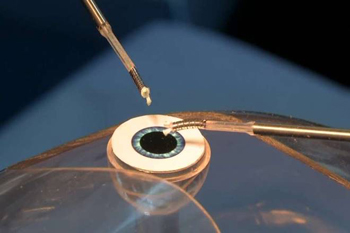London, May 10: A robot has been used to successfully perform a delicate eye surgery on six patients in a world- first trial which shows that robotic procedures can be more accurate than the trained human hand.
 In the trial, researchers from the University of Oxford in the UK performed the membrane-removal surgery on 12 patients. Six of those patients underwent the traditional procedure, and six underwent the new robotic technique.
In the trial, researchers from the University of Oxford in the UK performed the membrane-removal surgery on 12 patients. Six of those patients underwent the traditional procedure, and six underwent the new robotic technique.
Researchers found that those patients in the robot group experienced significantly fewer hemorrhages and less damage to the retina. The robot acts like a mechanical hand with seven independent motors that can make movements as precise as one micron, researchers said.
It operates inside the eye through a single hole less than one millimetre in diameter and goes in and out of the eye through this same hole during various steps of the procedure. However, the surgeon is in control, using a joystick and touch screen to manoeuvre the robot hand while monitoring movements through the operating microscope.
"The robotic technology is very exciting, and the ability to operate under the retina safely will represent a huge advance in developing genetic and stem cell treatments for retinal disease," Robert E MacLaren, professor at the University of Oxford was quoted as saying by 'Live Science'.
"We have demonstrated safety in a delicate operation. The system can provide high precision at 10 microns in all three primary directions, which is about 10 times more precise than what a surgeon can do," said Marc de Smet from University of Eindhoven in the Netherlands, who helped design the robot.
The team first used the system on a 70-year-old priest from UK, in September las year. Upon the success of that surgery, they conducted a study on 11 more patients in a randomised clinical trial, hoping to measure the robotic system's accuracy compared to the human hand.





Comments
Add new comment